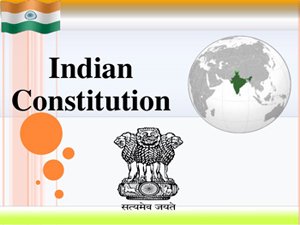What is Preamble? Discuss in detail of Preamble of Indian Constitution and its objects and significance.
What is Preamble? Discuss in detail of Preamble of Indian Constitution and its objects and significance. How can you say that according to Preamble, India is a sovereign, socialist, secular and democratic republic. How these are applied by the courts. Refer to some decided cases? How the various ideals and goals enshrined in the preamble have been realized in the constitution? Refer to some decided cases.

PREAMBLE OF THE CONSTITUTION:- The preamble of an Act sets out the purpose and object for which a statute is enacted. The Preamble of the constitution declares:- We the people of India having solemnly resolved to constitute of India into a sovereign, socialist, secular democratic Republic and to secure to all its citizens. :- i) Liberty of thoughts, expression, belief, faith and worship. Ii) Justice, social, economics and political. Iii) Equality of Status and opportunity and to promote among them all.. iv) Fraternity assuring the dignity of the individual and the unity integrity of the Nation. I our constitution Assembly this twenty-sixth day of November 1949 do hereby adopt enact and give to ourselves this constitution. The Purpose of Preamble:- The Preamble to the constitution is a key to open the mind of the makers for which they made several provisions in the constitution. In constitution, preamble occupies an important place & The constitution should be interpreted in the light of the ideas mentioned in the preamble. Keswanand Bharti v.State of Kerla 1973. In Berubari case SC held that preamble is not a part of the constitution and therefore it was never regarded as the source of limitations powers. But in Keswanand Bharti's case the SC held that Preamble is a part of the Constitution and all important is to be attached to it in interpreting the constitution. The Preamble to the constitution serves the following purposes:- i) It discloses the source of the constitution. ii) It lays down the date of the commencement of the constitution. iii) It sets out the rights and freedoms which the people of India wished to secure for themselves. iv) It declares the nature of the government which it wishes to establish in the country. The preamble declares that the people of India are the source of the constitution of India. The govt. derives all its authority from the people of India. Administrators are elected by the People of India. The nature of the government, which the preamble establishes is a sovereign, socialist, secular, democratic republic. Sovereign because const., does not recognize the legal supremacy of any other country. A democratic because of the govornment of the people, by the people and for the people. Secular because it treats all the religions equally. It does not recognise any religion as a State Religion. Socialist because it implies economic equality and equitable distribution of income. In such state important means of production is controlled by the State. And republic because the Head of State is not a hereditary Monarch, political sovereignty resides in the people and Head of State is President of India who is elected by the people for a fixed term. Objectives of the Constitution:- The objectives is to secure to its people, justice. Liberty, and fraternity, the dignity of the individual and the unity and integrity of the nation. // In keswaanand Bharti case it has been held that the preamble is the part of the constitution and therefore it can be amended by the Parliament under its amending power under article 368 with the condition that it should not exercise it amending power so as to destroy the basic features in the preamble. By 42nd amendment of the constitution of India, Parliament
2
did amend the Preamble inserting the words “ socialist secular” before” the Democratic Republic and “ integrity” before the nation. Spirit of these amendments only expressly stated what was already present in the constitution impliedly, the additions did not impair the basic features. In //Aruna Roy v. Union of India 2003 secularism has been held to be knowledge of and respect for all religions and fostering the feeling of respect for them. Although socialism has nowhere been defined in the constitution.//In D.S.Nakara v. Union of India 1983 it has been taken to mean raising the living standard of the weaker section and laborers and to guarantee for them lifelong social security while Excel Wear v. Union of India 1979, it was held that the effect of adding the word Socialist is that the court should give more effect to nationalization and state ownership. In brief, our socialism is a unique combination of Marxism.














